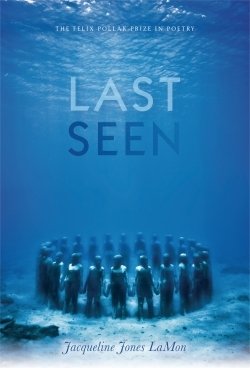Last Seen
Daily life, Jacqueline Jones LaMon believes, is filled with the absences of people and stories. “This silence is the source of these poems,” she writes. Inspired by photos of missing people, this collection responds by imagining the stories of how people meet and love or charting the voids that the missing have left behind.
LaMon’s forte is the persona poem, which sketches the outlines of those, as in “Florida Keys Unidentified,” who are “almost—but not quite—gone.” The persona (from the Greek for mask) alone is a powerful device, yielding dramatic monologues that allow the reader to enter the skin of an imagined other. But LaMon pushes further, bookending the collection with poems that speak to faux polygraph questions: “What is the cause of your mother’s suffering?” or “And what would you say if you could?” These writings introduce a world in which nothing is certain; in which one is always becoming; in which, tested, one hesitates, improvises, crumbles, transforms.
The constraints of form showcase LaMon’s craft, which is considerable. This collection includes pantoum, organic forms, and a section of unrhymed sonnets centering on the disappearance of a young woman whose car was found on the San Francisco Bay Bridge. Formal but never stilted, these poems clamber surefooted over the rubble of the unknown and produce voices that astonish with their power.
The range of emotion—several poems imagine the stories of lovers first meeting—and of voices further testifies to LaMon’s skill. The circle of the affected widens beyond the missing to include parents, police, teachers, a network news director, a bridge fare taker, and even seagulls, who call out, “We know. Listen. / And you thought this was our mating call. We know.”
LaMon directs the MFA program in creative writing at Adelphi University and has previously written a novel and a poetry collection. Winner of the Felix Pollak Prize, Last Seen is a worthy addition to any public or private collection. Readers new to poetry will find the persona poems an accessible entry, and aficionados will admire LaMon’s music and control.
In sum, these poems enlarge one’s sense of specific losses, but also ponder what it means to be attached, to meet, to wonder, to lose. In “The Missing Girl’s Mother” the speaker grapples with the transformation that comes as the inevitable result of love and loss: “Tell me that I am a mother at all, my daughter / a rising of vapors. Explain to me, now, what I am.”
Reviewed by
Teresa Scollon
Disclosure: This article is not an endorsement, but a review. The publisher of this book provided free copies of the book to have their book reviewed by a professional reviewer. No fee was paid by the publisher for this review. Foreword Reviews only recommends books that we love. Foreword Magazine, Inc. is disclosing this in accordance with the Federal Trade Commission’s 16 CFR, Part 255.

